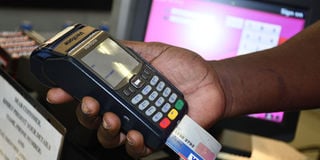Prime
Uganda’s digital card payments hit Shs532b

A customer uses a Visa card to complete a transaction. Most banks have linked their systems with mobile money services, allowing customers to move funds from their accounts to their phones. PHOTO / EDGAR R. BATTE
What you need to know:
The number of payment service providers in Uganda now stands at 27 with many applications on the waiting list to be licensed.
More Ugandans are using digital payment channels to complete their transactions.
According to Bank of Uganda (BoU), about Shs581 billion was transacted through debit card payments in the last quarter of 2023, up from Shs532 billion in the quarter to September 2023.
Speaking during the third Bank of Uganda Financial Stability Symposium at Kampala Serena Hotel last week, the executive director supervision Bank of Uganda, Dr Tumubweine Twinemanzi said all electronic money is backed by funds held in trust accounts.
Dr Twinemanzi said during the same period, mobile banking transfers, the active number of users increased by 24.9 percent from 1.9 million users in quarter to September 2023 to 2.4 million in the quarter to December 2023.
“The volume of mobile money transactions increased by 7.7 percent from 1.6 billion to 1.7 billion while the value of transactions increased by 2.9 percent from Shs60.5 trillion to Shs62.2 trillion,” he said.
Mobile money platforms were, in the formative years, used mainly for person-to-person cash transfers but are now a major payment channel for businesses, a shift that has led to the growth in the amount of money moved through the wallets.
Dr Twinemanzi said bank accounts held at BoU were completely funded in advance to facilitate the settlement of Real -Time Gross Settlements transactions.
Hinting on the operation, Dr Twinemanzi said risk was rated moderate in the quarter ended December 2023.
“Low risk for Systemically Important Payments Systems (SIPS), operated without significant disruption in the quarter ended December 2023. Some fraud incidents remain in retail payment systems,” he said.
BoU is engaging payment service providers to address fraud and enhance cyber security and resilience practices.
He said the revised Interception of Communications Regulations, 2023 came into force. This is expected to mitigate fraudulent activities, with limits on the number of sim cards an individual can own.
He further stated that BoU will continue with public awareness and sensitization on risks in digital payments.
Deputy director payment systems at Bank of Uganda, James Bukuli said the number of payment service providers in Uganda stands at 27 and there are many applications on the waiting list to be licensed.
He said Fintech plays the role of aggregator and integrator.
“We want as many as possible in the country but the challenge we are still faced with is the pricing of digital services. The digital services prices are still very high,” he said.
He said even the commercial banks are now being licensed as payment service providers to any other person providing digital financial services provided they meet the requirements.




